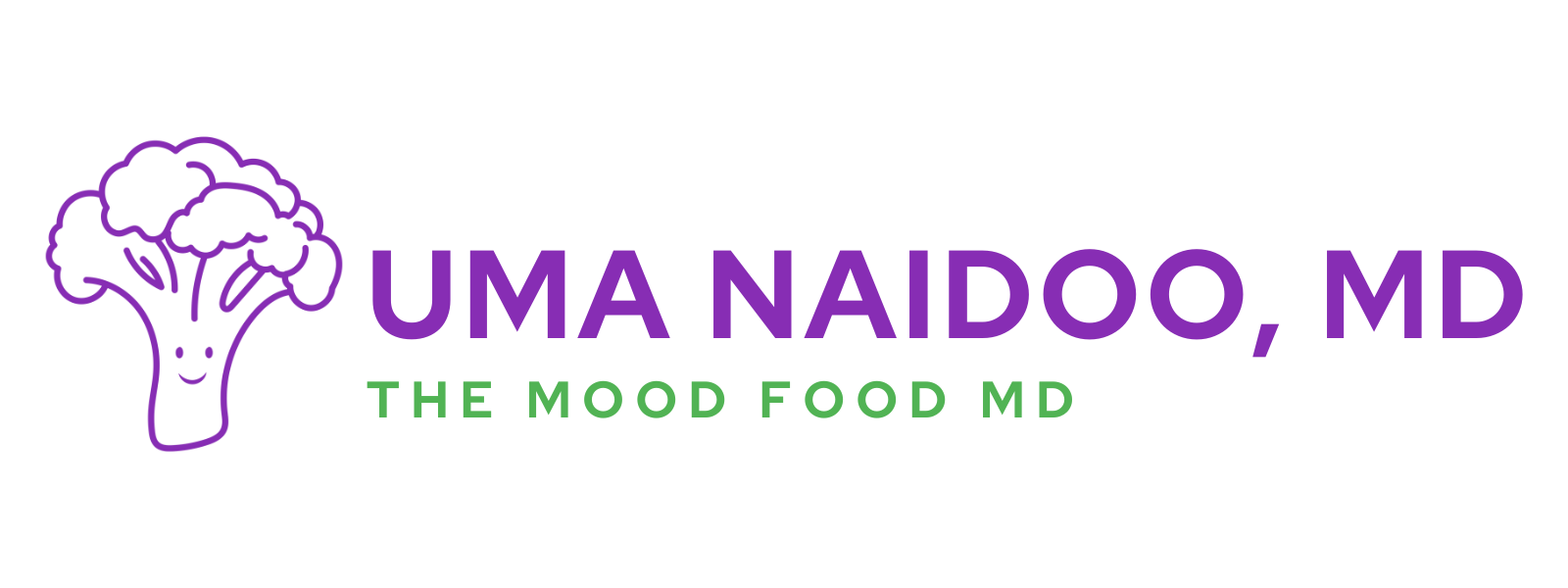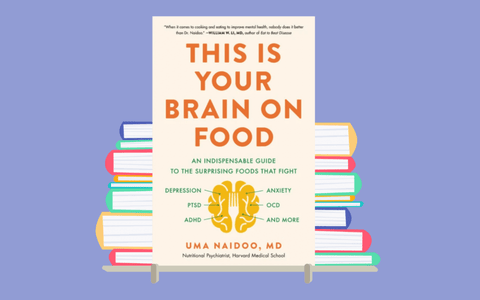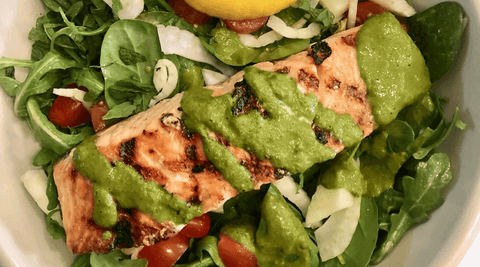What we eat affects more than our bodies. It also affects our brain. This Is Your Brain On Food by Dr. Uma Naidoo explains the latest research and uses it to provide nutritional recommendations and delicious brain-healthy recipes to optimize your mental health with food. Here’s an excerpt:
Many of us have experienced seeing or hearing of the cognitive decline of a loved one, a friend or a friend’s family member. Alzheimer’s dementia(AD) may have touched you in some way and I’m guessing it may have been painful – after all it’s scary that we can lose control over our brain, our thinking centre and the small but mighty organ that controls everything else in our bodies.
Our brain is body royalty! In the average adult human, the brain represents about 2% of the body weight. Yet, despite its relatively small size, the brain accounts for about 20% of the oxygen and, hence, calories consumed by the body. That is, it consumes ~20% of glucose-derived energy. How can we take care of our brain?
One very important way is by how we eat. You may wonder why food matters? Well it’s related to the very important gut-brain connection and our microbiome. The gut and brain arise from the exact same cells when our bodies are forming in the embryo. So even though the gut and brain are far apart in the body they are made from the same cells. Then these 2 organs are connected by the 10th cranial nerve called the vagus nerve, which acts as a 2-way super-highway channeling messages back and forth between the gut and brain and vice versa. Also, we often hear that serotonin is called the happiness hormone. It’s helpful to know that more than 90% of the body’s serotonin receptors are found in the gut! When it comes to mental health, it really does matter what you eat.
Back to dementia which comes in many forms. For example, vascular dementias occur due to blockages in blood vessels that stop blood from feeding brain tissue. Frontotemporal dementias are a general group of regional brain abnormalities that cause memory loss. Some abnormalities seen in Alzheimer’s brains are the build-up of protein among nerve cells called amyloid plaques that disrupt nerve-cell function. Dr. Rudolph Tanzi and his team played key roles in discovering three genes that cause early onset familial AD, including the amyloid protein precursor, and the presenilin genes (PSEN1 and PSEN2). He directs the Alzheimer’s Genome Project, in which they have identified several novel AD genes as well. Dr. Tanzi and his team have elucidated the mechanism of action by which one of these novel genes (CD33) initiates neuroinflammation in AD. This is where nutrition again becomes critically important.
While these conditions all stem from different parts of the brain and different causes, food can have a profound effect on all of them. Now that we understand the gut-brain connection, this becomes clearer. It’s not difficult to feel the connection between your gut and your memory. For example if you see an old partner who cheated on you, you might instantly become nauseous. If you drive down a street where you ate a delicious meal, you may start to salivate and your stomach might grumble. Given that your gut “remembers,” it should come as no surprise that it works hand in hand with your brain’s memory systems. The key to that connection lies in the chemicals that make your brain and body function, many of which are regulated by your gut.
For example, the stress hormone cortisol can disrupt your ability to recall long-term memories, and as we’ve covered before, your gut bacteria affect blood cortisol levels by regulating the hypothalamic- pituitary-adrenal axis. That means that the wrong balance of gut bacteria can lead to a spike in cortisol, which in turn can put a damper on your ability to recall memories. Memory is also affected by levels of other neurochemicals, such as noradrenaline, serotonin, and dopamine. For instance, we now know that noradrenaline enhances memory, especially when emotions are running high. And studies have identified a close association between a serotonin-dopamine imbalance and changes in brain tissue that lead to learning and memory impairment. Once again, all these neurochemicals are dependent upon gut bacteria to produce the necessary precursors to keep them at healthy levels.
The vagus nerve can enhance memory when stimulated because it connects to brain structures like the amygdala and hippocampus, which are central to memory formation. Since gut bacteria can change vagus nerve activation, that’s another way in which they affect your memory.
The most telling sign that there is a strong connection between the gut and memory is that the composition of gut bacteria changes in patients afflicted with several memory-related diseases. For instance, in Parkinson’s disease there is a significant decrease — 77.6 percent — of the specific gut bacterium Prevotellaceae compared to controls. And the microbiomes of Alzheimer’s patients have decreased Firmicutes, increased Bacteroidetes, and decreased Bifidobacterium.
Researchers also believe that gut bacteria trigger metabolic processes and brain inflammation that impact memory, and they may also compromise blood flow in the brain. In addition, changes in gut bacteria may increase amyloid deposits, thereby contributing to Alzheimer’s disease. Modification of the gut microbiome by diet or by using probiotics may offer new preventive and possible therapeutic options for Alzheimer’s.
The MIND diet (MIND stands for Mediterranean-DASH Intervention for Neurodegenerative Delay) has been shown to be effective at reversing and protecting against cognitive decline and Alzheimer’s disease. As the name hints, the MIND diet is a combination of two diets, the Mediterranean diet and the DASH diet. DASH stands for Dietary Approaches to Stop Hypertension.
Earlier studies of these individual diets had demonstrated that each may protect patients from cognitive decline on their own. However, in 2015, the late Martha Clare Morris and her colleagues developed the MIND diet as a powerful combination of the two for long- term brain health. Some experts now believe that the MIND diet offers the best evidence for protection of memory, so it’s well worth integrating as many aspects of it as possible into your daily eating habits.
My secret weapon suggestion is spices, a no- calorie, salt-free, sugar free way to help our brain. Turmeric, the golden yellow spice often associated with South Asian cuisine, hits the high notes and is adding to a soup, smoothie or tea if you don’t cook with it. Just always add a pinch of black pepper which enhances the bio-availability of curcumin, the active ingredient in turmeric, by 2000%. Other spices to add to your diet are cinnamon, saffron, rosemary ginger and sage.
Adapted from This Is Your Brain on Food: An Indispensable Guide to the Surprising Foods that Fight Depression, Anxiety, PTSD, OCD, ADHD, and More by Uma Naidoo, MD (Little, Brown Spark). For more foods to help your memory, see chapter 5 in the book.
Dr. Uma Naidoo is the first US Nutritional Psychiatrist, and is also a professional chef and studied nutrition. She is the Director of Nutritional and Lifestyle Psychiatry at Massachusetts General Hospital and serves on the faculty at Harvard Medical School.




